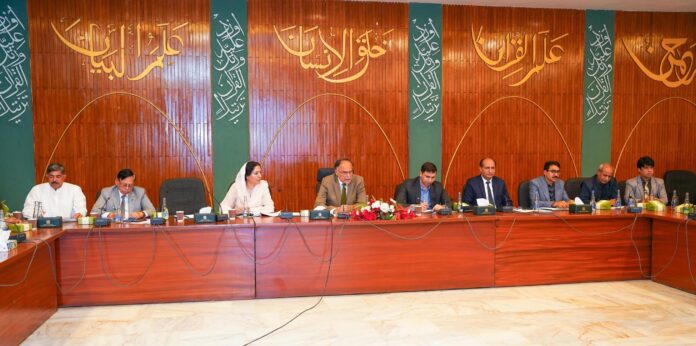ISLAMABAD: Minister for Planning, Development and Special Initiatives Professor Ahsan Iqbal on Thursday said the National Urban Planning Framework would help transform cities into engines of growth by providing effective governance, modern planning, efficient mass transit systems and enhanced security.
He expressed these views while chairing a meeting on the National Urban Planning Framework in Islamabad, attended by Parliamentary Secretary Wajiha Qamar, Additional Secretary for Planning, members of the Planning Commission and senior officials from various departments, a news release said.
Address the meeting, the minister said the framework aimed to ensure that Pakistan’s urban centers become “livable cities” that supported sustainable development.
Highlighting the growing challenges posed by rapid urbanization and population growth, Ahsan Iqbal stressed the need for improved land management, zoning and expert urban planning to address these issues.
He underscored the importance of preventing fertile agricultural land from being unnecessarily converted into housing schemes, urging the development of comprehensive policies to safeguard these vital resources.
Furthermore, he emphasized the need to integrate climate adaptation and mitigation measures into urban planning to protect cities from climate-induced threats.
During the meeting, it was revealed that 54% of Pakistan’s urban population resides in just 21 major cities, with 34.5% concentrated in mega-cities such as Karachi and Lahore. The rapid urban expansion is contributing to the proliferation of illegal settlements and informal housing, which violate planning regulations and adversely affect city functions.
Ahsan Iqbal called for greater collaboration between the Federal and Provincial governments to make cities safer, more resilient and livable through the National Urban Planning Framework.
He highlighted the urgent need to address key urban challenges, including environmental pollution, housing shortages, and the inefficient use of land resources, which are degrading the quality of urban life.
The minister also stressed the importance of improving urban transportation systems and providing adequate facilities for pedestrians and cyclists to make cities more environmentally friendly and youth-centric.
He directed all relevant agencies to prepare a comprehensive and sustainable urban planning framework that could serve as a model for other provinces and help transform Pakistan’s major cities into engines of economic growth.




